 W
WĐinh Thế Huynh is an Vietnamese and the former Executive Secretary of Secretariat of the Central Committee of the Communist Party of Vietnam. He stepped down in 2018 due to illness. . He is one of the country's five key leaders, along with the General Secretary, President, Prime Minister, and the Chairman of the National Assembly. Đinh Thế Huynh became a member of the Communist Party of Vietnam on 8 August 1974.
 W
WĐỗ Mười was a Vietnamese communist politician. He rose in the party hierarchy in the late 1940s, became Chairman of the Council of Ministers in 1988 and was elected General Secretary of the Central Committee of the Communist Party of Vietnam (CPV) at the 7th Congress in 1991. He continued his predecessor's policy of ruling through a collective leadership and Nguyễn Văn Linh's policy of economic reform. He was elected for two terms as General Secretary, but left office in 1997 at the 3rd plenum of the 8th Central Committee during his second term.
 W
WĐoàn Khuê was a Vietnamese Army general and Minister of Defence from 1992-1997.
 W
WHồ Chí Minh, born Nguyễn Sinh Cung, also known as Nguyễn Tất Thành, Nguyễn Ái Quốc, Bác Hồ, or simply Bác, was a Vietnamese revolutionary and politician. He served as Prime Minister of North Vietnam from 1945 to 1955 and President from 1945 until his death in 1969. Ideologically a Marxist–Leninist, he served as Chairman and First Secretary of the Workers' Party of Vietnam.
 W
WHoàng Văn Hoan was a personal friend of Ho Chi Minh, a founding member of the Indochinese Communist Party, and a Politburo member of the Lao Dong Party from 1960 to 1976. Born in Nghệ An Province in 1905, Hoan was a crucial link between the Democratic Republic of Vietnam and China, ambassador to Beijing 1950–1957, and leader of many delegations to China as Vice Chairman of the DRV National Assembly Standing Committee in the 1960s. Known for his pro-Chinese sympathies, Hoan reached the peak of his career in the early 1960s when North Vietnam temporarily adopted a pro-Chinese attitude in the Sino-Soviet dispute.
 W
WLê Đức Anh was a Vietnamese politician and general who served as the fourth President of Vietnam from 1992 to 1997. He previously led the Vietnamese forces in Cambodia throughout the 1980s. He was regarded as a conservative who advocated maintaining tight party control over domestic policies.
 W
WLê Duẩn was a Vietnamese communist politician. He rose in the party hierarchy in the late 1950s and became General Secretary of the Central Committee of the Communist Party of Vietnam (VCP) at the 3rd National Congress in 1960. He continued Hồ Chí Minh's policy of ruling through collective leadership. From the mid-1960s until his own death in 1986, he was the top decision-maker in Vietnam.
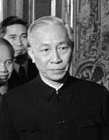 W
WLê Đức Thọ, born Phan Đình Khải in Nam Dinh Province, was a Vietnamese revolutionary, general, diplomat, and politician. He was the first Asian to be awarded the Nobel Peace Prize, jointly with United States Secretary of State Henry Kissinger in 1973, but refused the award.
 W
WLê Hồng Anh is a Vietnamese politician who was the Minister of Public Security of Vietnam from 2002 to 2011. He was conferred the rank of General by the President of Vietnam on January 9, 2005.
 W
WLê Khả Phiêu was a Vietnamese politician who served as General Secretary of the Communist Party of Vietnam from December 1997 to April 2001. Lê Khả Phiêu served in the Vietnam People's Army during the First and Second Indochina Wars, join in the Cambodian war, and was Head of the General Political Department of the Vietnam People's Army.
 W
WTrần Đức Lương is a Vietnamese politician who served as the fifth President of Vietnam from 1997 to 2006.
 W
WNgô Xuân Lịch is a Vietnamese politician and Vietnam's Minister of National Defence and Chief of the General Department of Politics of Vietnam. Ngô Xuân Lịch became a member of the Communist Party of Vietnam on 8 August 1974.
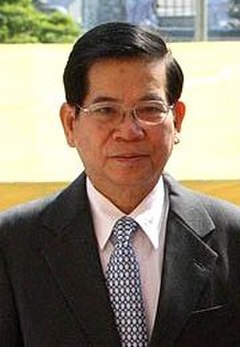 W
WNguyễn Minh Triết is a Vietnamese politician who served as the sixth President of Vietnam from 2006 to 2011. He was elected by the National Assembly of Vietnam with 464 votes (94%) in June 2006.
 W
WNguyễn Phú Trọng is a Vietnamese politician who has been the General Secretary of the Communist Party of Vietnam, the highest position in Vietnam since 2011. In addition, Trọng served as president of Vietnam from 2018 to 2021. As general secretary, Trọng heads the party's secretariat and is the Secretary of the Central Military Commission in addition to being the de facto head of the politburo, the highest decision-making body in Vietnam, which currently makes him the most powerful person in Vietnam.
 W
WNguyễn Sinh Hùng is a Vietnamese politician who served as Chairman of the National Assembly of Vietnam from 2011 to 2016. Nguyễn Sinh Hùng was previously one of the country's four "key leaders", along with Party General Secretary Nguyễn Phú Trọng, President Trương Tấn Sang and Prime Minister Nguyễn Tấn Dũng, during the 11th National Congress of the Communist Party of Vietnam. He graduated from the University of National and World Economy in Bulgaria.
 W
WColonel General Nguyễn Tân Cương is a Vietnamese general, currently serving as Chief of the General Staff and Deputy Minister of Defence. Nguyễn Tân Cương was born in 1966 in Hà Nam Province, joined the Central Committee of the Communist Party of Vietnam in 2016, and served as the Commander of 4th Military Region.
 W
WNguyễn Tấn Dũng is a Vietnamese politician who served as the Prime Minister of Vietnam from 2006 to 2016. He was confirmed by the National Assembly on 27 June 2006, having been nominated by his predecessor, Phan Văn Khải, who retired from office. At a party congress held in January 2011, Nguyễn Tấn Dũng was ranked 3rd in the hierarchy of the Communist Party of Vietnam, after State President Trương Tấn Sang. Following the 12th National Congress of the Communist Party of Vietnam, Nguyễn Tấn Dũng wasn't able to maintain his post in the party and stepped down from his position as Prime Minister on 7 April 2016.
 W
WNguyễn Thị Kim Ngân is a Vietnamese politician who served as the first female Chairperson of the National Assembly of Vietnam from 31 March 2016 to 30 March 2021. She was a member of the 12th Politburo of the Communist Party of Vietnam, in which she ranked second, after General Secretary of the Communist Party Nguyễn Phú Trọng. She previously served as Deputy Chairperson of the National Assembly of Vietnam.
 W
WNguyễn Văn An is a Vietnamese politician who served as Chairman of the National Assembly of Vietnam from 2001 to 2006. Nguyễn Văn An was Appointed Chairman on 27 June 2001, An was a proponent of government and administrative reform. He was re-elected on 23 July 2002. On 24 June 2006 he resigned, citing his age and the need for a new generation of leaders to take over.
 W
WNguyễn Văn Linh was a Vietnamese revolutionary and politician. Nguyễn Văn Linh was the general secretary of the Communist Party of Vietnam from 1986 to 1991 and a political leader of the Vietcong during the Vietnam War. During his time in office, Linh was a strong advocate of "Đổi Mới" (renovation), an economic plan whose aim is to turn Vietnam economy to a socialist-oriented market economy. As such, Linh was often touted as the "Vietnamese Gorbachev" after the Soviet leader, who introduced Perestroika.
 W
WNguyễn Xuân Phúc is a Vietnamese politician currently serving as the President of Vietnam, one of the highest-ranked officials in Vietnam along with Nguyễn Phú Trọng, General Secretary of the Communist Party of Vietnam. Phúc ranked 2nd in the Communist Party's 13th Politburo behind Nguyễn Phú Trọng and was ranked 3rd in the 12th Politburo. Nguyễn Xuân Phúc is also a full member of the National Assembly, serving in its 11th, 12th, 13th and 14th terms. He was elected to the post by the National Assembly of Vietnam on 5 April 2021 after serving 5 years as Prime Minister of the country. Nguyễn Xuân Phúc became a member of the Communist Party of Vietnam on 12 November 1983.
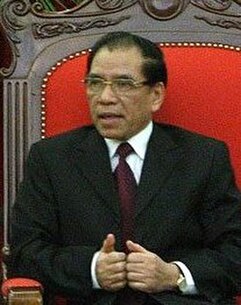 W
WNông Đức Mạnh is a Vietnamese politician who served as General Secretary of the Communist Party of Vietnam, the most powerful position in the Socialist Republic of Vietnam, from 22 April 2001 to 19 January 2011. His parents were Tày peasants. Nông Đức Mạnh was born in Cường Lợi, Na Rì District, Bắc Kạn Province. His own son is Nông Quốc Tuấn, party secretary for Bắc Giang Province.
 W
WPhạm Hùng was a Vietnamese politician and the 2nd Prime Minister of the Government of the Socialist Republic of Vietnam from 1987 to 1988.
 W
WPhạm Minh Chính is a Vietnamese politician, the current Prime Minister of Vietnam, one of the highest-ranked officials in Vietnam along with Nguyễn Phú Trọng, General Secretary of the Communist Party of Vietnam and Nguyễn Xuân Phúc, President of Vietnam. He is currently a Member of Politburo of the Communist Party of Vietnam Term XIII, Head of Committee for the Internal Political Protection of the Central Communist Party of Vietnam, Member of the National Assembly of Vietnam session XIV. He is General of the People's Public Security Forces and a Member of Politburo term XII, formerly Secretariat of the Communist Party of Vietnam Session XII, Head of the Organizing Commission, Deputy Director of Organizing Commission; Secretary of the Provincial Party Committee of Quang Ninh province; Deputy Minister of Public Security, General Director of General Department of Logistics and Technology, Ministry of Public Security, Ministry of Public Security; Deputy Director-General of the General Department of Intelligence.
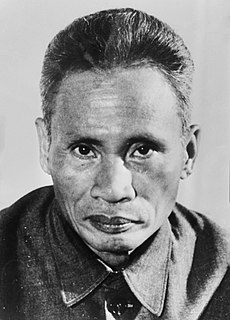 W
WPhạm Văn Đồng was a Vietnamese politician who served as Prime Minister of North Vietnam from 1955 to 1976. He later served as Prime Minister of Vietnam following reunification of North and South Vietnam from 1976 until he retired in 1987 under the rule of Lê Duẩn and Nguyễn Văn Linh. He was considered one of Hồ Chí Minh's closest lieutenants.
 W
WPhạm Gia Khiêm is a Vietnamese politician who was Deputy Prime Minister of Vietnam from 1997 to 2011 and former Minister of Foreign Affairs (2006-2011). He was previously Minister of Science, Technology and Environment from November 1996 to September 1997, and was born in Hanoi. He was a lecturer at Bắc Thái College of Electrical Engineering from 1968 to 1970, and gained a Ph.D. in Metallurgy in Czechoslovakia in 1975. He is fluent in English, Russian and Czech.
 W
WPhạm Văn Trà is a Vietnamese politician who served as Vietnam's Minister of Defense from 1997 to 2006.
 W
WPhan Văn Khải was a Vietnamese politician who served as the fifth Prime Minister of Vietnam from 25 September 1997 to 27 June 2006.
 W
WNguyễn Cơ Thạch was a Vietnamese revolutionary, diplomat, and politician. He was Foreign Minister of Vietnam from February 1980 to July 1991. Thạch was seen as pragmatic and influential . His time in office coincided with part of Vietnam’s transition from an ideology-based alignment to the Soviet bloc towards a pragmatic approach to foreign policy, including the primacy of economic over ideological considerations, integration into ASEAN and closer relations with non-socialist countries. However, Mr Thạch’s efforts to normalize relations with the United States were not successful.
 W
WPhùng Quang Thanh was Vietnam's Minister of Defense from 2006 to 2016.
 W
WTô Lâm is a Vietnamese politician, who has been Minister of Public Security of Vietnam since 9 April 2016. Tô Lâm is a member of the 12th Politburo of the Communist Party of Vietnam and considered to be one of the more promising members' of the Vietnamese Government, having previously served as Deputy Minister of Public Security on an exemplary level. Tô Lâm became member of the Communist Party of Vietnam on 22 August 1981.
 W
WTrần Đại Quang was a Vietnamese politician who was the eighth President of Vietnam, in office from 2 April 2016 until his death in 2018. Trần Đại Quang was elected to the post by the National Assembly of Vietnam, and nominated by his predecessor Trương Tấn Sang who retired from office. Trần Đại Quang was one of the country's top leaders, along with the Communist Party General Secretary Nguyễn Phú Trọng.
 W
WTrường Chinh was a Vietnamese communist political leader and theoretician. He was one of the key figures of Vietnamese politics. He played a major role in the anti-French colonialism movement and finally after decades of protracted war in Vietnam, the Vietnamese defeated the colonial power. He was the think-tank of the Communist Party who determined the direction of the communist movement, particularly in the anti-French colonialism movement. After the declaration of independence in September 1945, Trường Chinh played an important role in shaping the politics of the Democratic Republic of Vietnam (DRV) and creating the socialist structure of the new Vietnam.
 W
WTrương Tấn Sang is a Vietnamese politician, who served as the seventh President of Vietnam from 2011 to 2016. He was one of Vietnam's top leaders, alongside prime minister Nguyễn Tấn Dũng and Party general secretary Nguyễn Phú Trọng. In July 2011, Trương Tấn Sang was elected state president of the Socialist Republic of Vietnam by the National Assembly of Vietnam and nominated by his predecessor Nguyễn Minh Triết who retired from office.
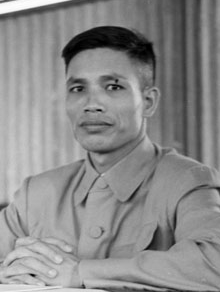 W
WVăn Tiến Dũng, born Co Nhue commune, Từ Liêm District, Hanoi, was a Vietnamese general in the People's Army of Vietnam (PAVN), PAVN chief of staff (1954–74); PAVN commander in chief (1974–80); member of the Central Military–Party Committee (CMPC) (1984–86) and Socialist Republic of Vietnam defense minister (1980–87).
 W
WVõ Nguyên Giáp was a Vietnamese general and communist politician who is regarded as having been one of the greatest military strategists of the 20th century. He served as interior minister in President Hồ Chí Minh's Việt Minh government, the military commander of the Việt Minh, the commander of the People's Army of Vietnam (PAVN), minister of defence, and deputy prime minister. He also served as a member of the Politburo of the Vietnam Workers' Party, which in 1976 became the Communist Party of Vietnam.
 W
WVõ Chí Công was a Vietnamese Communist politician, and the Chairman of the Council of State of Vietnam between 1987 and 1992. He was the Standing Deputy Chairman of the National Front for the Liberation of South Vietnam from 1962 to 1976.
 W
WVõ Văn Kiệt was a Vietnamese politician who served as the Prime Minister of the Socialist Republic of Vietnam from 1991 to 1997. He was a well regarded Vietnamese revolutionary and political leader. He was a revolutionary veteran fighter in the long war against the French colonialists and then South Vietnamese and American forces in South Vietnam during the Vietnam War. In the difficult years following the war, he was one of the most prominent political leaders that led the innovation policy in Vietnam. He served as Prime Minister of Vietnam from 8 August 1991 to 25 September 1997, the period experienced the communist nation's return to the world arena after decades of war and isolation.
 W
WVũ Văn Ninh is a Vietnamese politician and was previously one of four Deputy Prime Ministers of Vietnam headed by former Prime Minister Nguyễn Tấn Dũng.